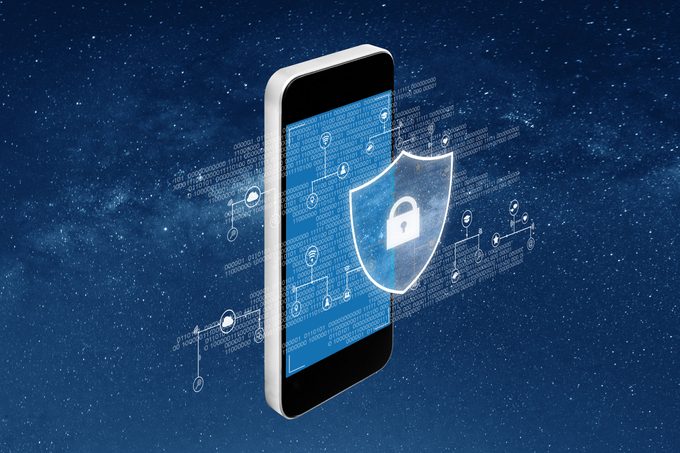What are encrypted phones? They have a feature you're probably using on your phone without knowing it—and that's a good thing.

Encrypted Phones: What It Means and How It Works

Encryption may sound like a digital buzzword, but even if you’re not tech-savvy, encryption is a very important part of your life. More than likely, your bank, credit card companies—and even some social media sites that you use—incorporate encryption to protect your data. Your phone probably has this capability too. What are encrypted phones—and what is their big benefit?
We consulted tech experts, including cybersecurity consultant Tom Kirkham, founder and CEO of IronTech Security, to explain encrypted phones. Read on to learn all about this phone feature and how to use encryption to protect yourself from identity theft.
Get Reader’s Digest’s Read Up newsletter for more tech, humor, cleaning, travel and fun facts all week long.
What is encrypted data?
Encrypting your device means that the data (such as credit card info, social security numbers, addresses or any other extremely personal information) that is entered into the phone will be jumbled up, making it indecipherable to anyone who might be trying to steal your information. To unjumble the information, it has to be unlocked using a password, PIN or another key that identifies you as the owner of the information.
You know all those pins, passcodes, fingerprints and facial recognition you have to set up on your device? Those are used to generate the key for encrypting and decrypting your device. You can also use security apps to keep your phone protected.
What are encrypted phones, exactly?

Encrypted phones make it much harder for cybercriminals to gather your personal information because it is very difficult to decode encryption. Is encryption foolproof? Device encryption is an added layer of security and a necessary step to keep hackers away; more often than not, cybercriminals are going to see a device is encrypted and just move on because it’s too much work, experts say. It’s important to remember, though, that nothing is 100% effective when it comes to cybersecurity.
There are a couple of downsides to cell phone encryption. An important thing to keep in mind is that it does slow down your phone, depending on the amount of data and the age/speed of your phone.
A bigger caveat is that should you ever forget your PIN/password to your phone when it is encrypted, it is impossible to retrieve your data. A backup would be the only way to retrieve the data.
Both Android and iPhone devices fully support encryption out of the box, but you should still do your due diligence to keep your information safe.
iPhone encryption
When your iPhone is locked, personal information is automatically encrypted, as is any data on the iCloud.You can check this on your iPhone privacy settings.
Android encryption
Setting up encryption on your Android device is easy, even if you’re one of those people who doesn’t usually change the default setting on your phone. While there are many different types of Android phones and the menu options vary, these directions should get you to where you need to go without a lot of steps.
-
Open the “Settings” app.
-
Tap the search bar and type in “encrypt.”
-
Choose the encryption option.
-
Follow the onscreen instructions.
These steps don’t apply to newer Android devices, which are encrypted by default when you set up a lock screen. Some Android devices, such as certain models from Vivo, Huawei, and OPPO can’t be encrypted. If you try the steps and you can’t find an encryption option, contact your service provider. They will be able to determine if your phone can be encrypted or not.
Encryption can take up to an hour and can’t be interrupted, so you won’t be able to use your phone. Make sure your phone is plugged in while it is encrypting to prevent it from dying, too. If your phone dies while it is finishing the process you may lose all of your data.
How do you make a strong password?
Since the data on your phone can be viewed as unencrypted when your phone is unlocked, it’s essential to make sure the method to unlock your phone is strong, just in case it ever gets lost or stolen. For example, a weak password like 123456) or PIN like 0000 may put a device at risk to hackers regardless of the encryption’s strength. Make the password or PIN more complex, or use face recognition, your fingerprint or a pattern to unlock your phone.
About the experts
|
Why trust us
Reader’s Digest has published hundreds of articles on personal technology, arming readers with the knowledge to protect themselves against cybersecurity threats and internet scams as well as revealing the best tips, tricks and shortcuts for computers, cellphones, apps, texting, social media and more. We rely on credentialed experts with personal experience and know-how as well as primary sources including tech companies, professional organizations and academic institutions. For this article that answers the question, “What are encrypted phones?” Alina Bradford tapped her more than 25 years of experience as a tech reporter. We verify all facts and data and revisit them over time to ensure they remain accurate and up to date. Read more about our team, our contributors and our editorial policies.
Sources:
- Tom Kirkham, cybersecurity expert and founder and CEO of IronTech Security
- Jack Mannino, former CEO of nVisium and expert in application security
- Tim Koster, tech expert and founder of CleverCreations























